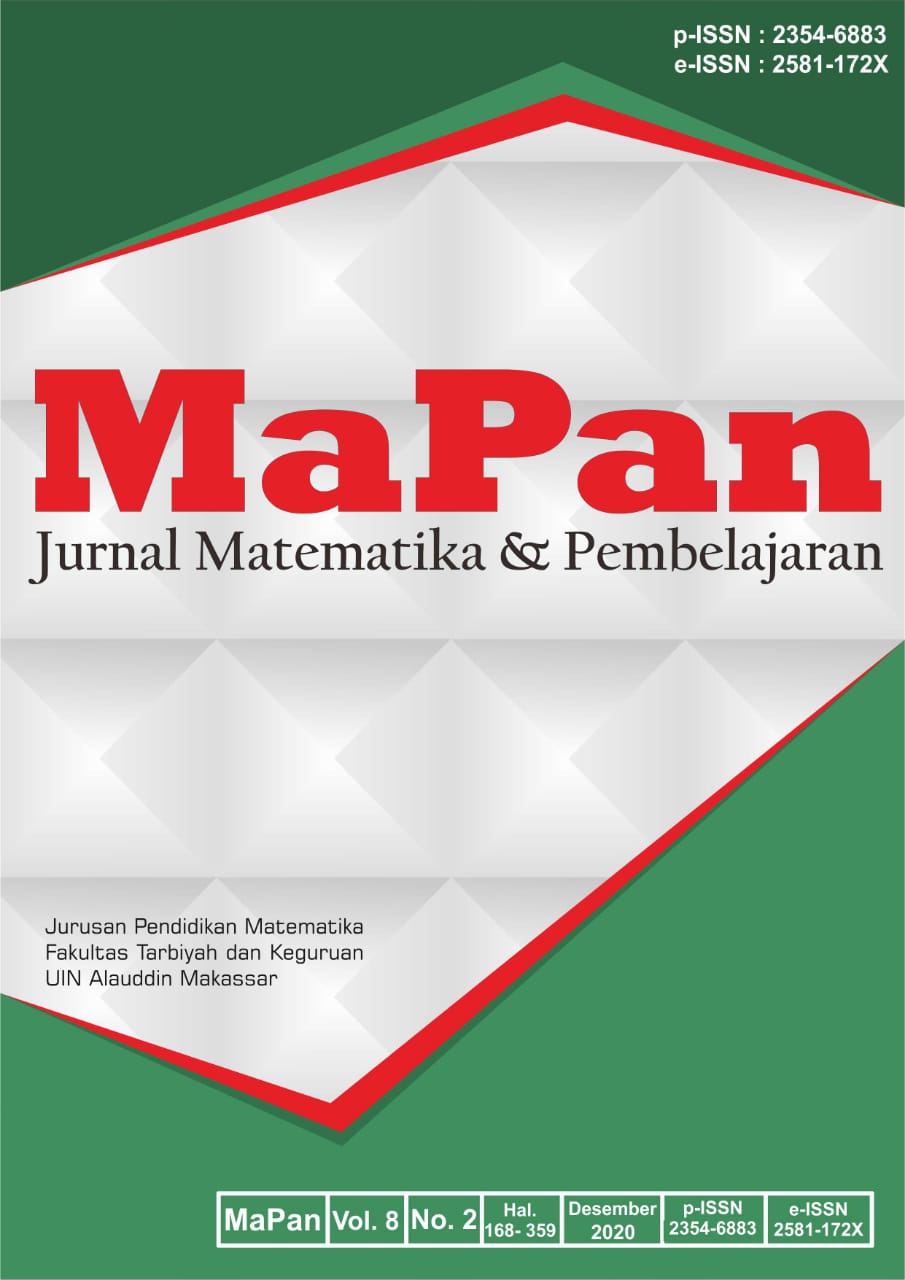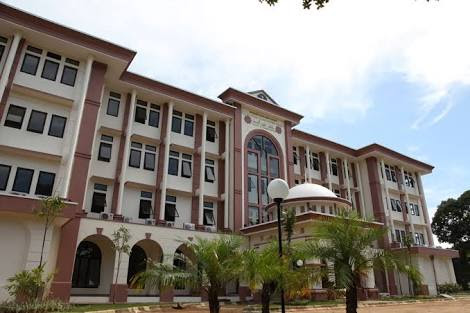ALGEBRAIC THINKING ABILITY AND LEARNING INTEREST THROUGH SOCIAL MEDIA-BASED PICTORIAL PUZZLE IN NEW NORMAL ERA
Abstract
Algebraic ability is one of the most important abilities to be developed because it becomes the basis to achieve other mathematical thinking ability. In new normal era, information through social media is the main thing for society, particularly for children of the current generation. This study aims to describe algebraic thinking ability and students' interest in learning through social media-based pictorial puzzles. The method of the research is descriptive quantitative. The samples of this study were 6 students of grade VIII SMP Edu Global School in Cirebon city. This study indicates that algebraic thinking ability and students' interest in learning algebra are still classified as moderate and have not reached the high category, so it needs to be improved in the learning process.
Downloads
References
Angriani. (2017). Kemampuan Berpikir Aljabar dan Self-Efficay Matematis Siswa SMP melalui Pendekatan Concrete Pictorial-Abstract (CPA). Pacasarjana UPI: Tidak diterbitkan.
Badawi, A., Rochmad, & Agoestanto, A. (2017). Analisis Kemampuan Berpikir Aljabar dalam Matematika pada Siswa SMP Kelas VIII. Unnes Journal of Mathematics Education, 5(3), 76–83. https://doi.org/10.15294/ujme.v5i3. 13100.
BSNP. (2006). Panduan Penyusunan Kurikulum Tingkat Satuan Pendidikan Jenjang Pendidikan Dasar dan Menengah. Badan Standar Nasional Pendidikan.
Common Core State Standards Initiative (CCSSI). (2010). Common Core State Standards for Mathematics. Washington, DC. National Governors Association Center for Best Practices and the Council of Chief State School Officers.
Crook, C. (2012). The ‘digital native’ in context: tensions associated with importing Web 2.0 practices into the school setting. Oxford Review of Education, 38(1), 63–80. https://doi.org/10.1080/03054985.2011.577946.
Devi, K., Eragamreddy, G., & Lakshmi V, V. (2019). Role of Social Media in Teaching-Learning Process. Journal of Emerging Technologies and Innovative Research, 6(1), 96–103. Retrieved from https://www.researchgate.net/publication/330497773_Role_of_Social_Media_in_Teaching-Learning_Process.
Drijvers, P., Goddijn, A., & Kindt, M. (2010). Algebra Education: Exploring Topics and Themes BT - Secondary Algebra Education: Revisiting Topics and Themes and Exploring the Unknown (P. Drijvers (ed.); pp. 5–26. SensePublishers. https://doi.org/10.1007/978-94-6091-334-1_1.
Foster, D. (2007). Making Meaning in Algebra: Examining Students’ Understandings and Misconceptions. In A. H. Schoenfeld (Ed.), Assessing Mathematical Proficiency (pp. 163–176). Cambridge University Press. https://doi.org/ 10.1017/CBO9780511755378.017.
Gnadig, P., Honyek, G., & Riley, K. (2001). Puzzling physics problems, with hints and solutions. Cambridge(UK). UK: Cambridge University Press.
Greenhow, C. (2006). From blackboard to browser: An examination of teachers’ constructivist beliefs and practice in using the internet. USA: Harvard University.
Kalpidou, M., Costin, D., & Morris, J. (2010). The Relationship Between Facebook and the Well-Being of Undergraduate College Students. Cyberpsychology, Behavior and Social Networking, 14(4), 183–189. https://doi.org/10.1089/cyber.2010.0061.
Kambuaya, C. (2015). Pengaruh motivasi, minat, kedisiplinan dan adaptasi diri terhadap prestasi belajar siswa peserta program afirmasi pendidikan menengah asal Papua dan Papua Barat di Kota Bandung. Share Social Work Journal, 5(2), 157–166. https:// doi.org/10.24198/share.v5i2.13140.
Katz, I., Assor, A., Kanat-Maymon, Y., & Bereby-Meyer, Y. (2006). Interest as a Motivational Resource: Feedback and Gender Matter, but Interest Makes the Difference. Social Psychology of Education, 9(27), 27–42. https://doi.org/10.1007/s11218-005-2863-7.
Lange, K., Booth, J. L., & Newton, K. J. (2014). Learning aLgebra From. 107(7).
Lederer, K. (2012). Pros and Cons of Social Media in the Classroom, Campus Technolog. Campus Technology.
Loyola, C. (2016). Teaching-learning Process: Instructional Media and Technology, Dale’s Cone of Experience.
Maftoon, P., & Sarem, S. (2012). The Realization of Gardner’s Multiple Intelligences (MI) Theory in Second Language Acquisition (SLA). Journal of Language Teaching and Research, 3(12), 33–41. https://doi.org/ 10.4304/jltr.3.6.1233-1241.
Martin, F., Hoskins, O., Brooks, R., & Bennett, T. (2013). Development of an Interactive Multimedia Instructional Module. Journal of Applied Instructional Design, 3(3), 5–17. Retrieved from https://www. researchgate.net/publication/272151941_Development_of_an_Interactive_Multimedia_Instructional_Module.
Naganjaneyulu, V., & Prasad, A. R. (2013). Mathematics Teaching, Learning and Assessment using Latest ICT tend Social Media. Asian Technology Conference in Mathematics. Thailand.
NCTM. (2000). Six Principles for School Mathematics. Reston, VA: NCTM.
Ng, R., & Latif, L. (2013). Social Media and the Teaching of Mathematics in a Lifelong Learning Environment. Journal of Chemical Information and Modeling, 53(9), 1689–1699.
Nisa, A. (2015). Pengaruh perhatian orang tua dan minat belajar siswa terhadap prestasi belajar ilmu pengetahuan sosial. Faktor: Jurnal Ilmiah Kependidikan, 2(1), 1–9. https://dx.doi.org/10.30998/.v2i1.370.
Oye, N., Rahim, Z. Z., & Helou, A. M. (2012). Students’ perceptions on social networking sites influence on academic performance. Journal of Social Networking and Virtual Communities, 1. https://doi.org/10.11591/ socnetvircom.v1i1.540.
Putri, D. K., Sulianto, J., & Azizah, M. (2019). Kemampuan Penalaran Matematis Ditijau dari Kemampuan Pemecahan Masalah. International Journal of Elementary Education, 3(3), 351–357. https:// http:// dx.doi.org/10.23887/ijee.v3i3.19497.
Slameto. (2003). Belajar dan Faktor-faktor yang Mempengaruhinya. Rineka Cipta.
Star, J. R., Foegen, A., Larson, M. R., McCallum, W. G., Porath, J., Zbiek, R. M., Windsor, W. (2015). Motivational Strategies in the Teaching of Primary School. Anales de Psicologia, 2(2), 369–376.
Wanti, N., Juariah, J., Farlina, E., Kariadinata, R., & Sugilar, H. (2017). Pembelajaran Induktif pada Kemampuan Penalara Matematis dan Self-Regulated Learning Siswa. Jurnal Analisa, 3(1), 56–69. https://doi.org/ 10.15575/ja.v3i1.1497.
Wati, E., & Saragih, M. (2018). Difficulties in Learning Mathematics Concepts in Algebra: A Case Study of Grade VII Students in ABC School Lampung. Polyglot: Jurnal Ilmiah, 14(1), 53. https://doi.org/10.19166/ pji.v14i1.453.
Copyright (c) 2020 Putik Rustika, Titi Rohaeti

This work is licensed under a Creative Commons Attribution 4.0 International License.


